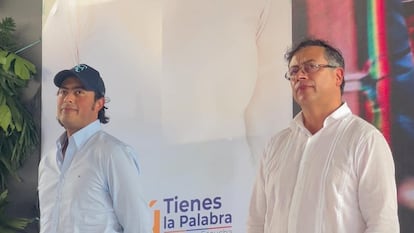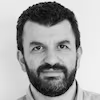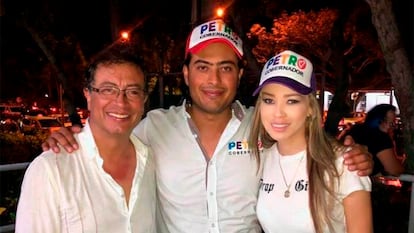Nicolás Petro admits his father’s presidential campaign benefitted from illegal financing
The admission to the Attorney General’s office could compromise President Gustavo Petro’s position


There’s a saying in Colombia that there’s no worse enemy than a friend in the same line of work — a saying that is rarely so accurately illustrated as by the case of President Gustavo Petro’s eldest son, who participated in his father’s election campaign and who has just informed the Attorney General that it was financed in part by dirty money.
Under arrest following allegations by his ex partner, Daysuris del Carmen Vásquez, Nicolás Petro decided to collaborate with the prosecution and admit that the campaign which put his father in office depended on money from dubious sources. Now the president himself may face charges that will undoubtedly affect his remaining three years in power.
How election campaigns are funded has been a recurrent problem in Colombia. Only a month and a half ago, the Attorney General charged Óscar Iván Zuluaga, a presidential candidate in the 2014 elections, for receiving dirty money from the corrupt Brazilian company Odebrecht. His son David, who ran his election campaign, was also charged. Almost 30 years ago, President Ernesto Samper saw his four years at the helm overshadowed by charges that his campaign had received money from the notorious Cali drug cartel; he spent most of his time in power trying to defend himself against the accusations. His case affected an entire generation of politicians, with a number ending up in jail and the country plunged into crisis. This time, it is the actual son of the president who has put his presidency in jeopardy and not, as in the case of Samper, a political rival, lending the scandal an unexpected twist.
This was spelled out on August 3 by the opposition politician Jotapé Hernández, from the Green Alliance, who denounced Petro before the legislative entity in charge of investigating presidents, the Chamber of Representatives’ Commission for Allegations.
“He’s not being denounced by the opposition, but by his own son,” he said. Meanwhile, the president himself made it clear that it was important to note who was making the allegations. “The President has never asked any of his sons or daughters to commit the crime to win or finance campaigns, or for anything that has to do with power,” he said. He also added that he had not been responsible for his son’s upbringing.

Despite this, Nicolás Petro has been seen as his father’s political heir apparent, the only one of his children who has been at his father’s side in the race for votes and power. After the political campaign in 2018, when Petro lost to the conservative candidate Iván Duque, Nicolás joined the demonstrations, drummed up support in various areas and acted as head of the campaign in Barranquilla, where he lives. The closeness between father and son was such that in the following regional elections in October 2019, Nicolás stood as his father’s candidate in Atlántico province, one of the richest and most densely populated provinces in Colombia, which was dominated by the right.
In the end, Nicolás failed to win the vote in 2019 but, like any good father, Petro applauded his son’s efforts and made him head of his Colombia Humana party in the entire Colombian Caribbean.
In a tweet in response to his son’s ex-wife expressing pride in her then-husband, Petro wrote, “Nicolás Petro ran the campaign he was meant to. Atlántico has chosen to remain under [Alejandro] Char, launching them as rivals of Colombia Humana in the immediate future. Nicolás now has the enormous job of leading Colombia Humana in the entire Caribbean.”
Nicolás became a deputy in the Atlántico assembly. From there, he was entrusted with the electoral campaign of his father in 2022 in the Caribbean and Petro was voted president. Then, last March, Vásquez — upset because Nicolás had an affair with her best friend, who is now his partner and carrying his child — leaked what has become a major scandal, telling the magazine Semana that Nicolás had received money for the campaign from a former drug trafficker, the son of a questionable contractor and other dubious sources — money that he also used to finance a luxurious lifestyle.
Father and son had already distanced themselves before this revelation when Petro asked that Nicolás and his brother Juan Fernando be investigated for another scandal. But Vásquez had planted a timebomb which went off on August 3 when, after five days behind bars, Nicolás confessed.
The confession has overshadowed his father’s launch of the ceasefire with the National Liberation Army (ELN), as well as the issuing of the shortlist for female candidates for the Prosecutor’s Office and the end of the interim period for the Culture Ministry, all events that promised to provide a boost to Petro in the days running up to his first anniversary as president. Petro was once again on the defensive. He dedicated his recent trip to Sincelejo to maintaining his innocence and reiterated his intention not to stand down.
The solid evidence behind Nicolás’ admission is yet to be established, as is the extent to which it will hamper Petro’s presidency. Samper, for example, managed to hang on to power but his policies, which were similar to those of Petro, lost impetus. Given that Petro recently said that a politician voted in on the back of money from narcos was “illegitimate and very fragile,” his position is far from strong. Having side-stepped damage from his political rivals, his potential downfall has been orchestrated from the least expected quarter — a confession from his heir apparent.
Sign up for our weekly newsletter to get more English-language news coverage from EL PAÍS USA Edition
Tu suscripción se está usando en otro dispositivo
¿Quieres añadir otro usuario a tu suscripción?
Si continúas leyendo en este dispositivo, no se podrá leer en el otro.
FlechaTu suscripción se está usando en otro dispositivo y solo puedes acceder a EL PAÍS desde un dispositivo a la vez.
Si quieres compartir tu cuenta, cambia tu suscripción a la modalidad Premium, así podrás añadir otro usuario. Cada uno accederá con su propia cuenta de email, lo que os permitirá personalizar vuestra experiencia en EL PAÍS.
¿Tienes una suscripción de empresa? Accede aquí para contratar más cuentas.
En el caso de no saber quién está usando tu cuenta, te recomendamos cambiar tu contraseña aquí.
Si decides continuar compartiendo tu cuenta, este mensaje se mostrará en tu dispositivo y en el de la otra persona que está usando tu cuenta de forma indefinida, afectando a tu experiencia de lectura. Puedes consultar aquí los términos y condiciones de la suscripción digital.








































